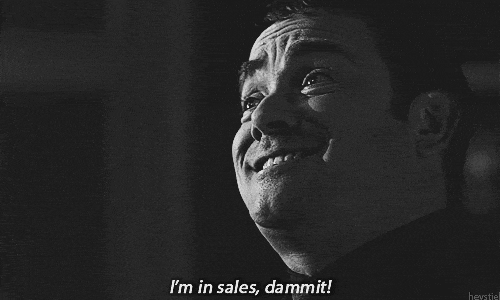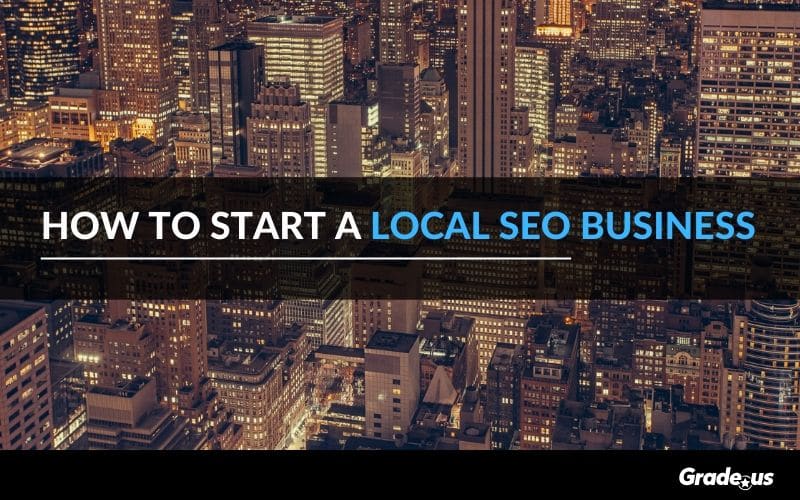This is it, the year you’re finally ready to pull the trigger on starting a local SEO business.
Bad news first: there’s no such thing as a sure-fire SEO business start-up kit.
Now the good news: it’s not exactly rocket science. People need your services, and if you’re a local SEO expert, then you can make a really good living launching either an agency or a solo consultancy.
This step-by-step guide will show you the way.
Table of Contents
What marketing skills do I need to start a local SEO business?
Apparently, there are a lot of people out there who want to start a local SEO agency, but who don’t know how to do local SEO marketing.

We need to assume you at least know the basic fundamentals of local marketing. Maybe you have even worked with another local digital marketing agency in the past.
If you haven’t, you should consider Phil Rozek’s advice,
“Become someone’s low-paid apprentice, or do local SEO for free before you try to make a career out of it. In that order.”
Test your skills on your own local site or reach out to a couple of nonprofit organizations in your area and offer to do work on their local SEO for free.
The first local business I ever worked with was a local theatre group in a small town. You can reach out to churches, animal shelters, or anyone else who seems to be struggling with their digital presence. These can also be a good source of reviews for your agency.
They can also be a good source of referrals for you, which will help you grow your local SEO business.
As you begin working pro-bono, refine and systemize your process. Figure out your project management strategy, your documentation, your preferred communication channels and anything crucial to the success of working with paying clients.
Are you motivated to put in the work and time required to succeed at local SEO?
- Are you passionate about local SEO?
- Could you read about digital marketing day in and day out?
- Does the thought of spending all day trying to convince Google to take down a competitor's fake reviews excite you?
- How about claiming and filling out local listings while trying to walk busy business owners through the Google My Business verification process, (knowing some of them will miss the phone call 6 times or will throw the postcard away when they get it)?
You will need to hone some valuable soft skills as a local SEO consultant. There’s an education component. You’ll need to convince business owners why certain strategies and tactics are worth spending money on. You will need to successfully wrangle information and assets from a business owner that has a million other priorities. You will need to develop relationships within your community that will ultimately benefit your client’s digital presence.
- Do you like link building?
- Do you have any idea how to get some?
- Can you handle 50 rejections to earn 1 link?
- Are you interested in doing comprehensive website audits?
- Will you write fresh content or find someone who will?
Local SEO is work, like any other work. Some of it is a frustrating grind. Many clients do not understand how it works, which means many will always suspect that you’re not generating enough value for their money.
In other words, this isn’t a path to easy riches. Don’t do it if you can’t love it.
How to position your local SEO business
There are essentially four ways to position your local SEO business.
Each strategy presents unique benefits and challenges.
Your choice should be an intersection between certain circumstantial factors and your own personal interests and aptitudes.
Each of these comes with scoring factors that you can use to determine whether the specialty is the right one for you.
#1. Become a local marketing generalist
You’ll take any client you connect with, so long as you’re both eager to work with each other. This is a dangerous path, because it makes it very difficult for you to differentiate yourself in a marketplace that’s already insanely crowded.
That’s not to say it’s not without advantages. From Rozek, again:
“You see many more situations and get to draw ideas from different types of businesses and business models. Then you can apply them to whatever type of client you happen to be working for.”
Scoring Factors
1 point – You have the time and energy to do a great deal of inbound content marketing about local SEO.
1 point – You are an extremely curious person and you’re excited about learning about a wide variety of industries. You’re a good researcher and a good listener.
1 point – You have the time to ramp up a little more slowly, or business contacts around the world who might serve as an early client base, or as an early source of referrals.
#2. Serve a specific local industry
By offering industry specific local SEO services, you’re able to position yourself as an expert who understands the specific industry specific challenges of your clients.
You could serve all doctors and dentists, or drill it down even further to serve mental health care practitioners and only mental health care practitioners. You could serve only lawyers, or only realtors.
Make a list of every local business type you can think of. There are some that are easy to overlook, like local attractions, hair salons, and financial advisors. Then pluck out one or two that might appeal to you.
Scoring Factors
1 point – You have a connection to the industry you’re considering. You’ve worked within it before, it’s the family business, or you’ve always just kind of been a geek for it.
Marketing experience counts here: after 11 years of trying to help lawyers I know an awful lot about what’s good and bad about how they try to market themselves.
You can score this multiple times: if you used to work as a paralegal and you are a geek who secretly listens to legal podcasts and you have worked with them before then you can go right ahead and give yourself three points.
1 point – You’ve researched your market and you see dozens of very bad Google My Business listings in that industry: folks who haven’t claimed them, aren’t generating reviews, and who maybe don’t even have websites. If there’s a need close to home you’re giving yourself an even greater edge.
1 point – You already have contacts in this industry that you can use to network your business.
#3. Serve a single geographic area
Jason Parks is the Founder of The Media Captain, and he chose to serve Columbus, Ohio, the same city where his business is located.
“I would say the advantages of starting an SEO firm in your local market far outweigh the challenges. You are able to meet with clients face-to-face, which should improve your percentage chances of closing the deal. You’ll have a better grasp on local business issues, since you’ll be familiar with the cities and suburbs in the local area. Additionally, your own marketing initiatives will be more targeted and precise, focusing on your own backyard.”
Scoring Factors
1 point – Your market has enough people to support your business. Note you can get creative here. For example, there are local SEO experts who specifically serve specific rural zones. Miriam Ellis put out a wonderful step-by-step guide on starting an seo agency aimed specifically at helping these very small businesses in these very small places, and doing so in a way that was beneficial and do-able for all parties.
1 point – You’ve researched your market, and it isn’t already saturated with other local SEO businesses who have positioned themselves in exactly the same way.
1 point – You are ready to take advantage of the in-person marketing methods that will make this work: meetups, networking events, trade shows, and running community seminars. The idea of shaking hands and exchanging business cards offline is exciting to you.
#4. Specialize in solving a specific, common problem
Let’s looking at three classes of business that have specific local SEO problems.
1. Service-area business. If you go this route, you’re essentially specializing by industry, too, as this is mostly going to be home services professionals.
Still, they have some real challenges ranking in all the cities they want to work in. If you can help them solve those challenges, you could be well-positioned to sell to them.
If you were already considering making contractors your target niche, you can give yourself an additional point in the contractor category.
2. Multi-location businesses. They can get snarled up fast. They suffer issues with website architecture, with managing listings as locations open and close, and with funneling reviews to the correct location. Things only get more complicated when the company is a national one. Do you know how to solve these problems?
3. Franchise businesses. Which means you’ll have to navigate the complex ways franchise owners interact with corporate oversight, mastering dozens of business models while convincing multiple stakeholders you’re the right fit.
Scoring Factors
1 point – You already have extensive experience with or a stellar reputation for solving these problems.
1 point – You have experience in selling services to larger companies, and know how to get to the decision makers in these companies.
1 point – You have people in your network who fit one of these three business models, and thus have a good source of referrals and early business all lined up.
After You Score
You’ll probably have at least two front-runners. For example, I earned 2 points for serving as a generalist, 3 points for realtors, 3 points for targeting the local area, and 4 points for lawyers and contractors.
You can also combine them.
If you see you’ve got more than enough lawyers or contractors in your local area to support a very healthy business, then you could drill right down to “serving contractors in Seattle, Washington,” or even, “serving lawyers in Washington State.”
If I did that, I’d have a solid 7 points either way.
Building a local SEO consultancy or local SEO agency?
There are some questions you really should ask yourself before you make the choice. An SEO consultant business plan isn’t vastly different from a consultant’s business plan until you start scaling, but the intent to scale is important.
Do I like the idea of hiring, firing, and managing people?
Hiring people is a whole to-do. You have to make sure you’re in compliance with federal and state laws. You have to be ready to handle payroll taxes. In almost every state, you’ve got to buy worker’s compensation insurance.
In fact, hiring your first employee could mean loading up on all kinds of new insurances.

Then there’s the process of hiring and training your first employee. Handling them if they suck at what they do. Firing them if they continue to suck at what they do.
Eventually all this people management stuff will become 99% of your job, because they’ll be out doing all the selling and the actual SEO.
Of course, if you want to make millions at this, then this is the only way to go.
Will I be satisfied with the income I can earn as a solo operator?
You are unlikely to make millions as a solo operator. You’re essentially creating a job for yourself. Your ability to make money will eventually be capped and limited by your time.
Of course, you’ll also be able to keep more of that money in your pocket. You won’t be paying it out to employees or sending as much of it to the IRS. You won’t be paying for an office, which a big agency might eventually need with a large remote workforce.
It’s okay to say you don’t care about making millions, by the way. Not everybody wants that. It’s just important to be realistic about your expectations.
Do I need someone whose skill set strengths compliment my skill set weaknesses?
You’re an amazing SEO consultant, but you hate sales? You might need a gregarious friend who can do all the talking.
You suck at money? Maybe you need someone who is good at it so you don’t go broke.
You don’t have to go full agency to take advantage of a partnership: you could get the best of both worlds by choosing one or two solid partners to take care of all the stuff you suck at.

There are many agencies operating from this very model.
Am I comfortable partnering with marketing agencies who do what I don't?
If you’re going to stay small you might want to partner with other agencies just so you don’t have to tell clients, “No, I don’t do that.”
This can be an incredible way to earn new business as well, as strong partners will keep sending people your way, too. You just really need to start building those partnerships before you’ve got clients to deal with.
Nailing down your unique selling proposition (USP)
You need a way to stand out.
If you look closely, you’ll notice a lot of agencies kind of spout the same old drivel. Look at any five agency websites, and you’ll have trouble remembering who was who an hour later. You’ve got to try to stand out.
Your USP may be related to your niche, but niche isn’t enough. It could be something like these options.
- My agency is all about communication, so you get access to your own dedicated client portal where you can access materials, see how your project is going, pull up reports and get your own next steps.
- Since my agency is local, I can come to your location and build a bank of photos for Google Posts so you don't have to scramble to get those.
- I educate you on how to do most of the work yourself and remain available for questions, so you get great results without paying high prices.
Really give it some thought. If you are tempted to say “experience” or “customer service,” go back to the drawing board. Everyone thinks they’ve the bees knees when it comes to customer service, and nobody cares about your combined 75 years of experience, or whatever.
Take some time to nail down what it is, exactly, you’re selling. Get beyond a list of services.
Ryan Conway of Digital Tradesman says it best:
“Unless you have money to spend on advertising, or months to wait on SEO, you’re going to need to do some sort of outbound activity to connect with people. But before you start pitching people on services, you will want to take some time to dial in what, exactly, it is you are selling, regardless of the activity.
The reason a lot of new founders lose deals, or can’t find clients, is because what they are offering is confusing, and in no way talks about ROI.”
Focus hard on how you’re going to provide your clients with value. Everything else will fall into place.
The business side of local SEO
You aren’t just getting traffic to websites and calls to business owners. You’re running a business yourself, here.
Do you need a local SEO business plan?
You don’t need one of those fancy ones you see in all the business books. Those are to score investors and lenders. Ideally you’ll just operate debt free, and if there are companies out there just dying to invest in marketing firms I haven’t heard of them.
You do need some idea of where you’re going through, and you need to jot down action steps or put together documents for 7 key areas of business.
#1. Pricing your services
Research what other local SEO companies are charging for their services. You’ll find a pretty vast range.
Will you charge a one-time fee? A monthly retainer? A per-service fee?
You might even want to shop some companies in your niche that you won’t be directly competing with later. If you’re going to do SEO for realtors, for example, you might call, say you’re Sally Houseseller, and list the services you need, and ask about pricing.
Call ten or twenty to get some solid numbers to work with.
Keep in mind the price depends largely on your confidence in asking for the price. Your presentation, professionalism, and reputation will matter a lot. So will the market you target and the services you offer for your money.
#2. Taxes & Accounting
Taxes suck. Get an accountant. They cost less than you think they do.
You’ll pay less taxes and you’ll stress less at tax time.
You have to account for the IRS no matter what.
#3. Marketing
Don’t forget to do all the stuff you propose to do for someone else’s business to and for your own business.
This is harder than it sounds. You need a plan from day one, or you need to set up a marketing machine before you take on your first client so everything’s in place from Day 1.
If you don’t, you’ll end up with a business nobody can trust. If your own GMB profile ranks in at #32, has 1 review, and looks like garbage, how can you expect anyone else to trust you with theirs?
#4. Prospecting & Sales
If you’re in love with the technical side of SEO and think of selling as the 9th circle of Hell, then you’re not alone. Unfortunately, you’re probably going to have to do some selling, either over the phone or in person.
Here’s the good news. There are a lot of people out there who aren’t getting the local SEO help they need, and many of them will give working with you a try on the most tenuous of trust signals.
Take it from Travis VanSlooten of TVS Internet Marketing.

“This advice is going to seem totally contradictory coming from an online marketer, but the quickest and easiest way to get your local SEO business off the ground is an old-fashioned offline marketing tactic: word-of-mouth.
Everyone knows at least one or two local business owners that probably need help with their websites and SEO. Think of your family members, relatives, and neighbors. Everyone you talk to should know you do local SEO. You’ll be amazed at how much business you can drum up just letting people know what you do!”
If you don’t feel comfortable talking to family and friends then you need more reasons to have more conversations, which means networking.
You can get to “yes” without a formal process, but it’s a good idea to figure one out all the same. Creating a process could be an article in its own right, so for now I’ll just direct you to a couple of resources to get you started.
#5. Service Agreements
You don’t have to lock clients into a contract, but you do need a written document which outlines:
- The exact services you'll render.
- The expectations your clients should have about those services.
- How, when, and what you expect to be paid.
- What happens when a client cancels your services.
- Who owns the rights to any copy, content, or images you create while working for the client.
- The fact that you aren't responsible if some third party does something insane in response to what you do.
- The fact that you aren't responsible if they ignore your advice and don't get the results you want.
While these can be informally shot over in an email, there’s a lot to be said for having a polished, formal document you can fire over.
#6. Accounts Payable & Receivable
Please do take a moment to calculate your overhead. We all know that there are 1,000 expensive MarTech tools out there which could help you do your job. Paying for them all could put you in the red if you don’t account for them.
You also need to set up a system for invoicing clients and getting paid.
#7. Client Communication & Retention
Most SEO agencies struggle to communicate value to their clients. How will you help them see that you’re a valuable resource they don’t want to get rid of?
Think long and hard about developing a reporting process, even if it’s just a “Friday check-in” to report this week’s work and wins.
Now you can get started.
Got all that down on paper? Great. Get your website and your GMB profile up, start your marketing engine, and start looking for clients. As soon as you have your first one, you’ve officially begun.
Testing, Tweaking, and Refining
There will be challenges, especially as you make mistakes, learn from those mistakes, and put routines and processes in place to prevent those mistakes from ever happening (mistakes will still happen). Absorb client feedback. Figure out how to get better at every aspect of your business.
This will be the key to keeping you in business, and to warding off burnout.
Additional Resources
The Grade.us blog offers a wealth of insight from other agency owners and founders who have met just about every challenge and who have fallen prey to just about every pitfall that you can imagine. There are also tons of template posts and how-to posts that can help you on your journey.
In particular, you might want to check out these five posts:
Do you have resources you’d like to share?
Nightwatch.io shared their fantastic Google Maps Marketing Guide.
Are you a local SEO agency founder with more insight to share?
Let us know in the comments below!








